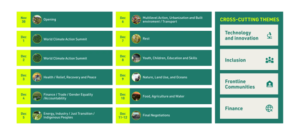Myles Fischer – November 10, 2023
COP 28 is Just a Few Weeks Away, Here’s What You Need To Know
What is COP?
The COP (Conference Of Parties) is the primary decision-making body of the United Nations Framework Convention on Climate Change (UNFCCC).
All countries that are parties to the UNFCCC are represented at the COP. The UNFCCC has 198 parties, which include 193 UN member states plus the European Union, the State of Palestine, the Holy See, the Cook Islands, and Niue.
Unless parties to the convention decide otherwise, they meet annually to ensure the effective implementation of the UNFCCC and previous legal instruments adopted at the COP.
The main goal of the UNFCCC is to ensure the stability of greenhouse gas concentrations is “at a level that would prevent dangerous anthropogenic (human-induced) interference with the climate system” and that “such a level should be achieved within a time frame sufficient to allow ecosystems to adapt naturally to climate change, to ensure that food production is not threatened, and to enable economic development to proceed in a sustainable manner.”
What has been achieved in previous years?
While COP is an annual gathering some years have produced more notable agreements than others. The Kyoto Protocol was adopted at COP 3 in 1997 and then entered into force in 2005. This was the first legally binding climate treaty of the COP. The Kyoto Protocol emphasized emissions reductions in developed countries. It set binding emissions reduction targets for 37 industrialized countries and economies in transition as well as the European Union that averaged 5 percent reductions from 1990 levels. In 2011, Canada withdrew from the Kyoto Protocol to avoid paying an estimated $14 billion in penalties for failing to meet its climate targets. Following its withdrawal, Canada faced international criticism from countries such as Japan, India, and China.
In 2015 another major climate treaty had been created at COP 21 in Paris. Here, the Paris Agreement set the goals of preventing the global average temperature from getting higher than 2°C above pre-industrial levels and to pursuing efforts to restrain the global average temperature from increasing to 1.5°C above pre-industrial levels. The Paris Agreement established Nationally Determined Contributions in which countries express their climate action plans for emissions reduction. Since its conception, the Paris Agreement has been central to climate negotiations.
What’s going down at COP 28 this year?
This year, COP 28 is set to take place in the United Arab Emirates between November 30th and December 12th, 2023. Each day of the conference is dedicated to a different aspect of climate action. However, there are four cross-cutting themes that are expected to be recurring throughout the conference: Technology and Innovation, Finance, Inclusion and Frontline Communities.

Via COP 28 UAE
Notably for young Canadians, December 8th will focus on Youth, Children, Education and Skills. The goal of this day is to bring young people into the fold in shaping the outcome of COP 28. The day will include various events on topics such as a climate-friendly school meals initiative, technology and innovation, networking for leaders from global higher education institutions, and more.
Canada has also been an active player in the build-up to COP 28. In July, Canada’s Minister of Environment and Climate Change, Steven Guilbeault, met with high-ranking ministers and officials from China and the European Union among others at the seventh Ministerial on Climate Action. Here, participants discussed their expectations for COP 28 and Canada’s minister announced $450 million in new funding for the Green Climate Fund, which is a funding effort of the Paris Agreement. Again in September, Minister Guilbeault was invited to facilitate discussions ahead of COP 28.
Why does COP 28 matter to young Canadians?
COP 28 will provide an opportunity for leaders to come together and talk. The conference has the potential to enable leaders to find out where they have shared interests to create policies for the collective good. The outcome of COP 28 is likely to impact Canadians for years to come. Canada has become heavily invested in climate action and is taking a meaningful position on the world stage’s discussions on climate change. There are significant costs to inaction and likewise, there are significant costs to mistakes in international negotiations. If young Canadians want a seat at the table in deciding what agreements are to shape our future, it is in our best interest to stay informed and voice our concerns.
About The Author:
